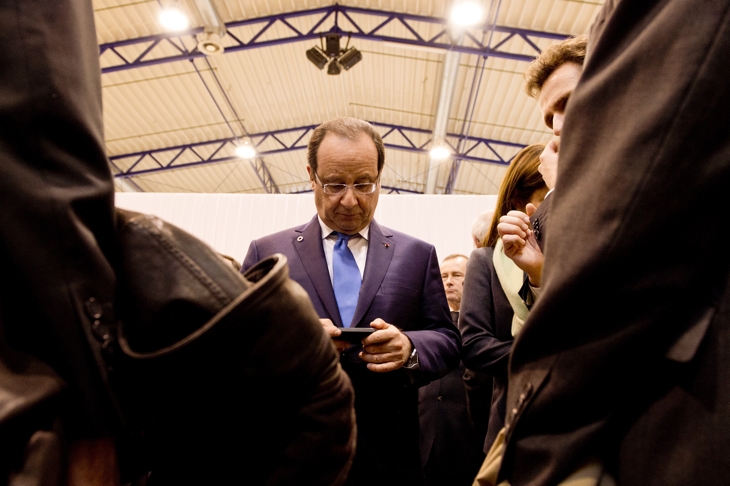It’s just as well François Hollande won’t have the opportunity to meet Donald Trump in person before he leaves the Élysée Palace in early May. It will save the outgoing president of France any potential embarrassment. When Angela Merkel visited Washington earlier this month she stood in stony silence as the American president claimed in front of the world’s media that his predecessor, Barack Obama, was a serial phone tapper. As The Donald memorably quipped, just about the only thing he and the German chancellor had in common was the fact they’d both, allegedly, had their phones bugged by the Obama Administration.
Now it’s claimed Obama wasn’t the only western leader with a penchant for eavesdropping. A 240-page book published in France last week, Bienvenue Place Beauvau, [the address of the President’s office and the Ministry of Interior] alleges that phone-tapping is one of the many dark arts authorised by François Hollande in what is known in his inner circles as the ‘cabinet noir’.
Two of the book’s three authors are journalists for Le Canard Enchaîné, the weekly satirical newspaper that in February accused François Fillon of creating a series of fictitious jobs for family members. The allegations have seriously damaged Fillon’s bid to become president and from the outset he believed he was the victim of a smear campaign orchestrated from the top. For weeks he had no evidence to go on, but the publication of Bienvenue Place Beauvau has been a godsend, a slice of good fortune after a miserable two months.
Although there are no claims in Bienvenue Place Beauvau specific to Fillon, the conservative candidate nonetheless wasted no time in making political capital out of the book. In a television interview on 23 March he said the book proved what he suspected all along: ‘We were seeking a secret cell and we have found it,’ he said. ‘The book explains how François Hollande has all judiciary wiretaps that might interest him sent straight to his office, which is completely illegal.’
Fillon, who emphasised that the authors were ‘far from being my friends’, also claimed the president was complicit in government officials supplying newspapers with documents that had been seized from his office as part of the criminal investigation into the fictitious jobs probe. It all added up, said Fillon, to a ‘state scandal’, although subsequently one of the three authors has claimed that Fillon has twisted their words to suit his needs.
Marine Le Pen has also supported claims that a ‘cabinet noir’ exists, which is not that surprising given that the National Front leader has also been accused in recent weeks of misusing public funds. Others have accused Fillon of attempting to pin the blame for his own shortcomings onto Hollande. ‘I don’t believe at all that there is any orchestrated operation there,’ said François Bayrou, a political ally of Macron. ‘Conspiracy theories … prevent one from looking at one’s own responsibilities.’
The President’s justice minister, Jean-Jacques Urvoas, reacted angrily to the allegations, describing them ‘as fantastical as they are peculiar’. Pointing out that ‘intercepted communications are part of investigations carried out at the discretion of independent magistrates,’ Urvoas accused Fillon of ‘at best pure speculation and at worst a desire to manipulate reality’.
The cynic might wonder if the one manipulating reality isn’t Urvoas. After all, French presidents have a history of wire-tapping, going back to François Mitterrand, described by Hollande at an event last October to mark the centenary of his birth as ‘an exceptional Frenchman’ and a man who ‘never allowed himself to be discouraged’.
Nor did Mitterrand allow himself to worry too much about the law. In 1983 the man, who continues to be worshipped by the Socialist party, diverted an anti-terrorist unit from their work combating Middle East extremists to spy on his political enemies, including a journalist who was threatening to expose his secret lovechild. In total, more than 3,000 conversations were recorded and filed by the president’s office, a scandal that resulted in 2005 convictions of seven members of Mitterand’s entourage. Jacques Chirac and Nicolas Sarkozy were also implicated in ‘black cabinets’ during their terms in office, so one might say that Hollande is merely maintaining a very Gallic tradition.
With a month until the first round of voting, Fillon’s new strategy is his last opportunity to convince the electorate he is the victim of a dirty campaign. The overwhelming favourite after he crushed Nicolas Sarkozy and Alain Juppé in November’s conservative primary, the 63-year-old former Prime Minister had spent months carefully crafting an image of a man who was honest and upstanding, an antidote to the sleaze of the past. Now the majority of the French population distrust him and he trails third in the polls behind Emmanuel Macron and Marine Le Pen.
But Fillon’s strategy doesn’t appear to be working. Far from winning over the French public, he is turning them off, as are his rivals in an increasingly tawdry presidential campaign where inquiries and not issues are dominating discussions. According to a poll published in Tuesday’s l’Opinion newspaper the ‘cabinet noir’ will result in more ‘votes blanc’, the French expression for a blank vote. In a 2014 survey, 26 percent of respondents said they were considering such a move, a figure that now stands at 40 percent. French politicians may be adept at tapping phones but they’re struggling to tap into the electorate.







Comments